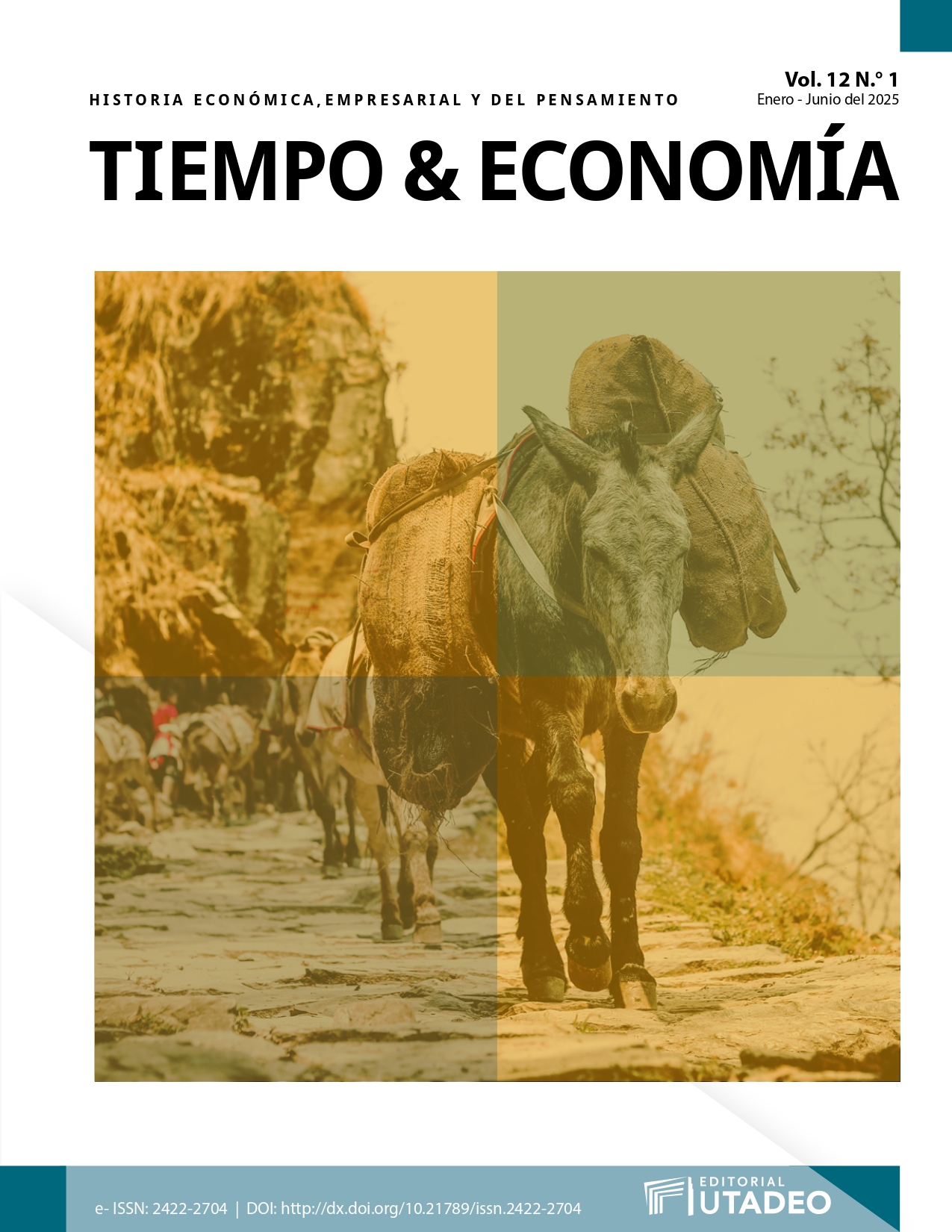
Esta obra está bajo una licencia internacional Creative Commons Atribución-NoComercial-CompartirIgual 4.0.
Esta obra está bajo una licencia internacional Creative Commons Atribución-NoComercial-CompartirIgual 4.0.
Resumen
This study examines the impact of renewable energy and other related variables on economic performance in Zambia, focusing on data from 2000 to 2022. The primary objective is to assess how various aspects of renewable energy, including consumption and access, affect GDP and its growth. Using the Jamovi software, a descriptive statistical analysis, a regression analysis, and a correlation analysis were conducted on data from the World Bank and the International Renewable Energy Agency. The study reveals that while renewable energy consumption negatively affects GDP growth, access to clean cooking technologies significantly promotes it. In addition, the share of renewable energy in electricity generation and access to electricity are positively correlated to improvements in rural electrification. However, the share of renewable energy in electricity generation does not have a significant direct impact on GDP. These findings suggest that strategic investments in renewable energy must be balanced with efforts to improve access to clean technologies to maximize economic benefits. Policymakers should focus on improving rural electrification and integrating renewable energy projects into broader infrastructure development. The study underscores the importance of targeted policies and technological advances to optimize the economic impact of renewable energy. Recommendations include investing in renewable energy initiatives with a focus on long-term economic outcomes, improving rural electrification policies, and exploring further research on technological innovations and their economic impacts. The study contributes to the existing literature by providing a detailed analysis of the role of renewable energy in economic performance in the Zambian context, highlighting both its potential and limitations. Its innovation lies in the use of comprehensive data analysis techniques and triangulation to provide actionable insights for policy development and future research.
Citas
Atkinson, G., & Hamilton, K. (2003). Savings, growth and the resource curse hypothesis. World development, 31(11), 1793-1807. https://doi.org/10.1016/j.worlddev.2003.05.001
Azam, M. (2020). Energy and economic growth in developing Asian economies. Journal of the Asia Pacific Economy, 25(3), 447-471. https://doi.org/10.1080/13547860.2019.1665328
Bhattacharya, M., Paramati, S. R., Ozturk, I., & Bhattacharya, S. (2016). The effect of renewable energy consumption on economic growth: Evidence from top 38 countries. Applied energy, 162, 733-741. https://doi.org/10.1016/j.apenergy.2015.10.104
Chishimba, S. (2022). Possibilities and Limitations of Solar Energy as a Sustainable and Renewable Power Source to Help End the Current Power Deficit in Zambia. Przedsiębiorstwo we współczesnej gospodarce–teoria i praktyka, 34(1), 56-82.
Crafts, N., & Woltjer, P. (2021). Growth accounting in economic history: findings, lessons and new directions. Journal of Economic Surveys, 35(3), 670-696. https://doi.org/10.1111/joes.12348
Diallo, S., & Ouoba, Y. (2024). Effect of renewable energy on economic growth in sub‐Saharan Africa: Role of institutional quality. Sustainable Development, 32(4), 3455-3470. https://doi.org/10.1002/sd.2855
International Renewable Energy Agency. (2024). (IRENA) IRENASTAT Online Data Query Tool. Retrieved from https://pxweb.irena.org/pxweb/en/IRENASTAT/IRENASTAT
Kakoma-Bowa, C. N. (2020). Developing a Sustainability Framework for the Assessment of Renewable Energy Policies in Zambia. University of Johannesburg (South Africa).
Lee, C. C., & Chang, C. P. (2007). The impact of energy consumption on economic growth: Evidence from linear and nonlinear models in Taiwan. Energy, 32(12), 2282-2294. https://doi.org/10.1016/j.energy.2006.01.017
Makai, L., & Popoola, O. (2024). Assessment and selection of a micro-hybrid renewable energy system for sustainable energy generation in rural areas of Zambia. Renewable Energy, 232, 121036. https://doi.org/10.1016/j.renene.2024.121036
Muazu, A., Yu, Q., & Liu, Q. (2023). Does renewable energy consumption promote economic growth? An empirical analysis of panel threshold based on 54 African countries. International Journal of Energy Sector Management, 17(1), 106-127. https://doi.org/10.1108/IJESM-09-2021-0003
Mulenga, P. B. (2019). An analysis of economic growth, energy consumption and carbon emissions: the case of Zambia [Master’s Thesis, The University of Zambia]. http://dspace.unza.zm/handle/123456789/6129
Munyeme, G., & Jain, P. C. (1994). Energy scenario of Zambia: Prospects and constraints in the use of renewable energy resources. Renewable energy, 5(5-8), 1363-1370. https://doi.org/10.1016/0960-1481(94)90172-4
Ntanos, S., Skordoulis, M., Kyriakopoulos, G., Arabatzis, G., Chalikias, M., Galatsidas, S., ... & Katsarou, A. (2018). Renewable energy and economic growth: Evidence from European countries. Sustainability, 10(8), 2626. https://doi.org/10.3390/su10082626
Nyasha, S., & Odhiambo, N. M. (2022). Energy consumption and economic growth in Zambia: A disaggregated approach. Journal of Economic Policy and Management Issues 1(1), 1-11.
Nyoni, K. J., Maronga, A., Tuohy, P. G., & Shane, A. (2021). Hydro–connected floating PV renewable energy system and onshore wind potential in Zambia. Energies, 14(17), 5330. https://doi.org/10.3390/en14175330
Ocal, O., & Aslan, A. (2013). Renewable energy consumption–economic growth nexus in Turkey. Renewable and sustainable energy reviews, 28, 494-499. https://doi.org/10.1016/j.rser.2013.08.036
Oliveira, H., & Moutinho, V. (2021). Renewable energy, economic growth and economic development nexus: a bibliometric analysis. Energies, 14(15), 4578. https://doi.org/10.3390/en14154578
Omri, A. (2014). An international literature survey on energy-economic growth nexus: Evidence from country-specific studies. Renewable and Sustainable Energy Reviews, 38, 951-959. https://doi.org/10.1016/j.rser.2014.07.084
Papyrakis, E., & Gerlagh, R. (2004). The resource curse hypothesis and its transmission channels. Journal of Comparative Economics, 32(1), 181-193. https://doi.org/10.1016/j.jce.2003.11.002
Saidi, K., & Omri, A. (2020). The impact of renewable energy on carbon emissions and economic growth in 15 major renewable energy-consuming countries. Environmental research, 186, 109567. https://doi.org/10.1016/j.envres.2020.109567
Shahbaz, M., Raghutla, C., Chittedi, K. R., Jiao, Z., & Vo, X. V. (2020). The effect of renewable energy consumption on economic growth: Evidence from the renewable energy country attractive index. Energy, 207, 118162. https://doi.org/10.1016/j.energy.2020.118162
Sharma, S. S. (2010). The relationship between energy and economic growth: Empirical evidence from 66 countries. Applied energy, 87(11), 3565-3574. https://doi.org/10.1016/j.apenergy.2010.06.015
Stritzke, S., & Jain, P. (2021). The sustainability of decentralised renewable energy projects in developing countries: Learning lessons from Zambia. Energies, 14(13), 3757. https://doi.org/10.3390/en14133757
Vlahinić, N., & Zikovic, S. (2010). The role of energy in economic growth: the case of Croatia. Zbornik radova Ekonomskog fakulteta u Rijeci, časopis za ekonomsku teoriju i praksu-Proceedings of Rijeka Faculty of Economics, Journal of Economics and Business, 28(1), 35-60.
Wolde-Rufael, Y. (2009). Energy consumption and economic growth: the experience of African countries revisited. Energy Economics, 31(2), 217-224. https://doi.org/10.1016/j.eneco.2008.11.005
World Bank. (2024). World Bank Open Data. Retrieved from https://data.worldbank.org/.
Zafar, M. W., Shahbaz, M., Hou, F., & Sinha, A. (2019). From nonrenewable to renewable energy and its impact on economic growth: the role of research & development expenditures in Asia-Pacific Economic Cooperation countries. Journal of cleaner production, 212, 1166-1178. https://doi.org/10.1016/j.jclepro.2018.12.081
Zerbo, E. (2017). Energy consumption and economic growth in Sub-Saharan African countries: Further evidence. Economics Bulletin, 37(3), 1720-1744.

 PDF (English)
PDF (English)
 FLIP
FLIP












